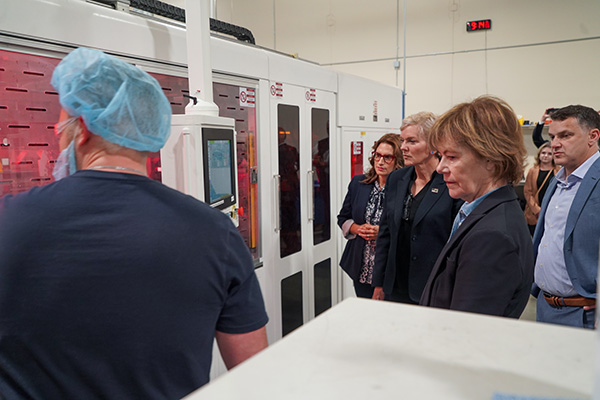Strong partnerships between clean energy companies and governments are crucial to promote sustainable businesses and job creation.
By Martin Pochtaruk CEO of Heliene
Many local governments have passed recent climate legislation throughout the country. Policies, incentives and funding to support ramping up renewable manufacturing and deployment while developing a workforce to support this growth are all steps in the right direction. For example, at the Federal level the Inflation Reduction Act (IRA) helps promote sustainable development, stimulates economic growth, and addresses climate change. Individual states have also introduced targets for zero emissions power generation (i.e. Minnesota by 2040).
Collaboration between renewable energy companies and government entities is crucial for furthering the impact and rollout of legislation and policies like those introduced in the IRA. Governments can create a conducive environment for renewable energy development by offering incentives, and favorable regulations. Together, governments and companies can establish clear frameworks that encourage the growth of the renewable energy sector, triggering job creation. Governments provide companies with a stable environment for planning and executing projects by setting long-term policies and targets. This predictability is necessary to attract investments and enable companies to grow. Collaborative efforts and consistent communication across policy, finance, project development, and community engagement will help all stakeholders achieve shared clean energy goals while creating jobs.
Financial Support: Funding is a critical aspect of any government-company collaboration. Governments can provide funding through grants, incentives, or low-interest loans to renewable energy companies, fostering research, development, and implementation of new technologies in exchange for jobs. This financial backing helps companies overcome initial investment barriers, encourages innovation in the renewable energy space, and can result in immediate payback as new activities are introduced to a community.
Policy Advocacy: Clean energy companies often navigate a complex regulatory landscape that varies by jurisdiction. Collaborating with local leaders can help align regulatory frameworks, streamline processes, while creating a conducive environment for clean energy investments. Formulating and implementing policies to encourage clean energy initiatives within a region involves collaboration between government leaders, policymakers, and stakeholders. Engaging with stakeholders, including local businesses, environmental groups, and community members makes it easier to understand their perspectives, needs, and concerns and address them accordingly. By carefully scrutinizing the current landscape, we can better understand the challenges and opportunities in our quest to transition toward a more sustainable energy future.
Job Creation: Government partnerships can support local renewable energy companies and foster job growth in the sector. A skilled workforce capable of meeting the demands of the growing cleantech sector is necessary to meet our climate goals. Training initiatives can include education on new technologies, safety protocols, and job-specific skills. The construction and maintenance of infrastructure projects, as well as manufacturing, smart grids, and energy storage facilities can generate employment opportunities within local communities.
Further, government and financial support helps regional companies to innovate, develop new technologies, and improve existing ones. This, in turn, enhances the competitiveness of these companies and contributes to local job creation and economic development.
Infrastructure Development: Clean energy companies often require support from local governments for the planning, permitting, and implementation of infrastructure development projects. By working together, these groups can leverage their expertise and resources to ensure these initiatives are environmentally friendly, economically viable, and socially responsible. Collaboration streamlines the development process, reduces costs, and ensures projects are completed on time and within budget. Ultimately, the success of these partnerships will depend on the willingness of all parties to work together towards a shared goal in mind.

Community Engagement and Economic Benefits: Governments must also engage with the private sector to ensure that renewable energy projects are socially and environmentally sustainable. Public awareness and support are vital to the success of these projects. Local government leaders have direct access to their constituents and can play a pivotal role in educating the community about the benefits of clean energy and sustainable practices. This includes facilitating outreach efforts, workshops, and educational programs to raise awareness and build local capacity and workforces. Cleantech projects do stimulate economic growth by creating jobs, attracting investments, and generating revenue for local communities. Partnerships between clean energy companies and local government leaders can maximize these economic benefits and ensure they are distributed equitably.
Despite these benefits, there are challenges associated with government-company partnerships in the renewable energy sector. One challenge is the potential for policy inconsistency and changes in government leadership. Political shifts can result in alterations to energy policies, creating uncertainty for companies and investors. To address this, governments must develop bipartisan, long-term energy strategies that lead to a long term stable job creation.
Partnerships between renewable energy companies and governments drive the transition towards a sustainable, low-carbon future. The synergy between private-sector innovation and public-sector policy-making can create a robust foundation for the growth of renewable energy. By addressing challenges and capitalizing on community benefits by creating jobs and economic development, these collaborations can reshape the global energy landscape, mitigating climate change and promoting a cleaner, more resilient energy system.

Martin Pochtaruk has 35 years of experience managing manufacturing and innovation businesses across Europe and the Americas. He founded Heliene, a technology-leading, high-quality solar PV manufacturer, in 2010. Heliene is challenging the solar industry status quo by putting customers first and manufacturing high-quality, competitively priced solar PV modules made to order in North America.
Scott Ellyson, CEO of East West Manufacturing, brings decades of global manufacturing and supply chain leadership to the conversation. In this episode, he shares practical insights on scaling operations, navigating complexity, and building resilient manufacturing networks in an increasingly connected world.